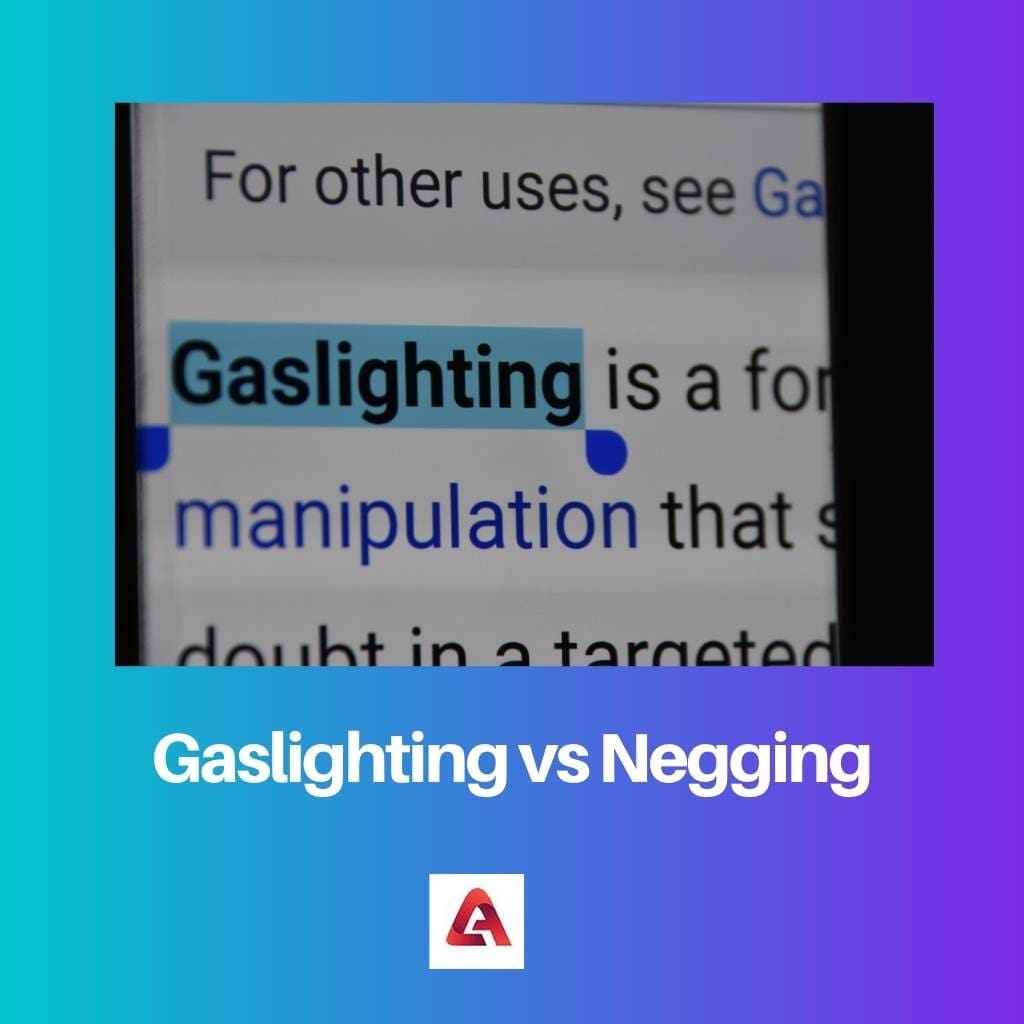Gaslighting and negging are two different forms of psychological manipulations. People combine them and assume they are the same things.
Gaslighting is like you are abusing someone emotionally and making them doubt themselves and even their reality. On the contrary, Negging is a form of manipulation, like a straightforward insult or abuse.
Key Takeaways
- Gaslighting is a form of emotional manipulation in which a person makes someone doubt their sanity or perception of reality. In contrast, Negging is a tactic used in dating or flirting where a person gives a backhanded compliment or slight insult to undermine the target’s confidence and make them more vulnerable.
- Gaslighting is a deliberate and calculated attempt to gain power and control over someone, while Negging is a strategy used to gain an advantage in a romantic or sexual context.
- Gaslighting can have severe and long-lasting effects on a person’s mental health and self-esteem, while Negging can cause a person to feel self-conscious and lower their self-esteem.
Gaslighting vs Negging
Gaslighting is a form of psychological manipulation where a person seeks to sow seeds of doubt in a targeted individual or group, making them question their own memory or perception. Negging is a manipulative strategy used in pick-up artistry where a person makes a deliberate backhanded compliment or flirtatious remark to another person to undermine their confidence.

Gaslighting is psychological abuse. It includes making the victim believe that they are going crazy, doubting themselves and even their memories so that the culprit has all the control and authority over them.
Negging is more like manipulating someone emotionally by suing some pickup line. It is more like an insult so as to gain public attention.
Comparison Table
| Parameters of comparison | Gaslighting | Negging |
|---|---|---|
| What is it? | Gaslighting is manipulating someone to take them under your control. | Negging is pickup like someone not as a compliment but as a criticism or an insult. |
| Characteristics | It involves mental and sometimes physical abuse by the victimizer, making the victim doubt themselves and believing that what they say is always right. | They compliment you, but instead of feeling good, you feel more embarrassed about yourself. |
| In a relationship | Being in a relationship like that, the victimizer seeks to gain all the right over you, how you feel, what you do, what you believe in, and everything like that. | Such relationships where a person is always negging do not end well. These are what we call a toxic relationship where someone is constantly correcting and insulting their partner. |
| Physical abuse | Gaslighting includes physical abuse too sometimes. | Negging does not include abusing someone physically but mentally. |
| Example | Torturing them, making them doubt themselves and their beliefs. | Complimenting like- you are pretty for a short person. |
What is Gaslighting?
Gaslighting is manipulating someone psychologically so much that they start doubting themselves, their memories, and even their reality.
Some of the instances of Gaslighting can be the denial by the abuser of the previous abusive acts of theirs, the intention of disorienting the victim by some bizarre events, and acts by the culprit.

What is Negging?
Negging is more like manipulating someone emotionally by suing some pickup line. It is more like an insult so as to gain public attention.
Some signs of negging are- you feel more embarrassed than good when someone compliments you or your attire, for instance- they say you are pretty for a short person rather than saying you are pretty or anything.

Main Differences Between Gaslighting and Negging
- Gaslighting includes physical abuse, too, sometimes, but Negging does not include abusing someone physically but mentally.
- An example of Gaslighting by someone is Torturing them, making them doubt themselves and their beliefs, while that of negging is Complimenting like- you are pretty for a short person.

- https://link.springer.com/content/pdf/10.1007/BF00922429.pdf
- https://journals.sagepub.com/doi/abs/10.1177/0003122419874843
- https://www.emerald.com/insight/content/doi/10.1108/JACPR-06-2016-0235/full/html

The article effectively outlines the characteristics and examples of both gaslighting and negging, providing valuable information for readers to recognize and respond to these manipulative tactics.
This resource is highly informative and presents a clear distinction between the two forms of manipulation.
The examples provided in this article effectively illustrate the behaviors associated with gaslighting and negging, giving readers a clear understanding of these forms of manipulation.
The comparison table effectively differentiates between gaslighting and negging, offering an organized framework to understand the distinct characteristics of each form of manipulation.
The comprehensive analysis provided in this article facilitates a nuanced understanding of gaslighting and negging, highlighting the need for greater awareness of these psychological tactics.
This article effectively explains the key differences between gaslighting and negging, providing important insights into the impact of each form of manipulation.
The references provided further validate the significance of this discussion, emphasizing the scholarly relevance of the topic.
I found the comparison table particularly useful in illustrating the contrasting characteristics of gaslighting and negging.
The detailed examples of gaslighting and negging help to clarify the behaviors associated with each form of manipulation, making it easier to identify them in practice.
The main differences highlighted are crucial for raising awareness about the distinct nature of gaslighting and negging.
Understanding these concepts can help individuals protect themselves from falling victim to these destructive behaviors.
The examples and characteristics provided in this article effectively distinguish between gaslighting and negging, ensuring readers gain a clear understanding of each form of manipulation.
The comparison between physical and mental abuse in gaslighting and negging highlights the severity of these tactics, shedding light on the detrimental impact they can have on individuals.
The references cited in this article enhance the credibility of the content, offering valuable insights into scholarly research on the topic.
The clarity provided in this article is essential for understanding the damaging effects of gaslighting and negging.
Thank you for highlighting the differences between gaslighting and negging. It’s important for people to understand the distinction to avoid falling victim to these forms of manipulation.
I agree. It’s crucial to be aware of these tactics and recognize them when they occur.
The inclusion of references in this article adds depth to the discussion of gaslighting and negging, highlighting the significance of academic research in understanding these psychological tactics.
The scholarly insights offered in this resource contribute to a comprehensive understanding of gaslighting and negging, emphasizing the importance of informed awareness.
The practical examples and explanations presented in this article are invaluable for raising awareness about the damaging effects of gaslighting and negging.
The detailed explanations of gaslighting and negging contribute to a comprehensive understanding of these psychological manipulations, emphasizing the importance of recognizing and addressing such behaviors.
This article offers valuable insights into the distinctions between gaslighting and negging, providing practical information for individuals to identify and respond to these manipulative tactics.